Oral Sedation Dentistry – Reston, VA
Creating a More
Relaxing Experience
Undergoing oral surgery can cause many patients to become nervous about their upcoming procedure. Although it is normal, it can result in individuals choosing to forgo treatment instead of moving forward with a process that will improve their oral health. Fortunately, our team at Northern Virginia Oral, Maxillofacial & Implant Surgery is here to offer options for oral sedation dentistry in Reston that will help keep patients relaxed and calm throughout their treatments. If you are interested in learning more about oral conscious sedation, IV sedation, nitrous oxide, and general anesthesia, give us a call.
Why Choose Northern Virginia Oral, Maxillofacial & Implant Surgery for Oral Sedation Dentistry?
-
We Accept PPO Dental
& Medical Insurance - Patient Comfort Comes First
-
Surgical Team Who
Delivers Patient-Focused Care
Oral Conscious Sedation

If you suffer from moderate dental anxiety or are preparing to undergo one or more lengthy procedures, oral conscious sedation may be right for you. Taken before your appointment, this pill medication will ensure that you become more relaxed and at ease while in the chair. Although you will be strongly sedated, you will remain comfortable and capable of responding to cues from our team. You will also be unlikely to remember much from your appointment.
What Is Oral Conscious Sedation?

If we determine that oral conscious sedation is a good fit for you, we will prescribe you a medication in pill form. All you have to do is swallow the pill shortly before your procedure is set to begin. The specific medication used for oral conscious sedation can vary, but we often use Valium, Ativan, or Halcion.
Within about 15 minutes of taking the pill, you should begin to feel its effects. You can expect to remain comfortable and relaxed throughout your appointment.
How Does Oral Conscious Sedation Work?
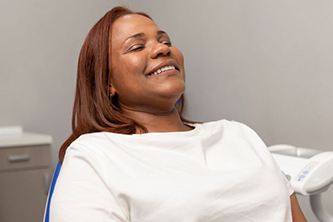
When the medication kicks in, you may start to feel extremely relaxed. You might even drift off to sleep, but you will not be completely unconscious. You will remain alert enough to respond to directions and questions from our team.
The effects of oral conscious sedation can linger for several hours, so you should have a trusted adult ready to drive you to and from your appointment. After the medication wears off, you may not have any recollection of what happened during your procedure. Many patients like this amnesiac effect because they feel uncomfortable when exposed to the sites, sounds, and sensations of an oral surgery treatment room.
Are You a Good Candidate for Oral Conscious Sedation?

You might be a good candidate for oral conscious sedation if:
- You struggle with moderate to severe dental anxiety or fear.
- You frequently cancel or reschedule oral procedures due to feelings of nervousness.
- You have an unusually sensitive gag reflex.
- You must undergo multiple or complex treatments in a single appointment.
- You do not have any contraindications that would make oral conscious sedation unsafe for you. For example, it is not typically recommended for pregnant people or individuals with certain allergies.
Nitrous Oxide Sedation
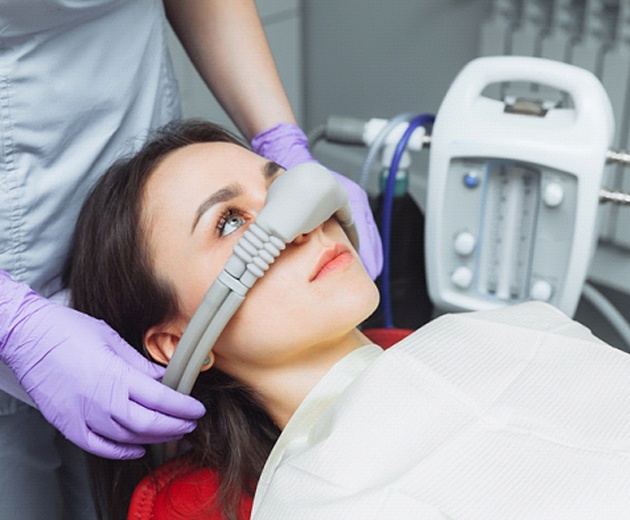
Commonly referred to as “laughing gas,” nitrous oxide is considered the mildest form of sedation and is safe for both children and adults. Administered via a mask that is worn over the nose, you will inhale the gaseous mixture, which will help you to enter into a relaxed state. Our team will monitor you throughout treatment and adjust the amount of sedation if necessary. Once we are finished with your procedure, we will remove the mask so that you are breathing fresh oxygen. In no time at all, you will feel completely normal and be able to resume regular activity.
Who Is a Good Candidate for Nitrous Oxide?
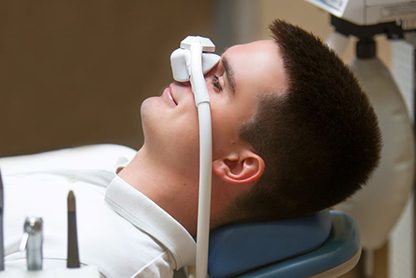
You might be able to benefit from nitrous oxide sedation if:
- You struggle with mild to moderate dental anxiety.
- It is difficult for you to sit still for extended periods of time.
- You want an easy sedation method that does not involve the use of needles or pills.
- You are not easily numbed by local anesthesia.
- You struggle with a strong gag reflex.
Nitrous oxide is safe for most people, though if you are pregnant or have certain other medical conditions, it may not be right for you. Our team will thoroughly screen you for any contraindications for sedation.
How Does Nitrous Oxide Work?
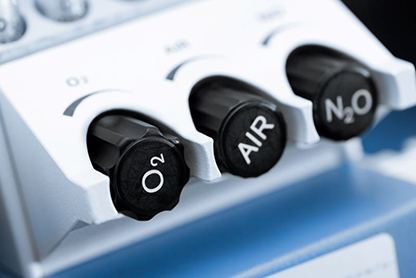
You can expect a simple and easy process with nitrous oxide. All we have to do is place a nasal mask on you. Then, we administer a mixture of oxygen and nitrous oxide. As you inhale the gases, you should very quickly begin to experience a relaxed sensation. Some people even feel a bit giddy or euphoric. You will remain conscious throughout your procedure, and we can adjust the level of sedation as necessary during your appointment.
Once your procedure is finished, the nasal mask will be removed. Within minutes, you should feel normal again. It should even be safe for you to drive yourself home!
Aftercare for Nitrous Oxide

Nitrous oxide wears off quite quickly, but we will still ask you to stay in our office for a few minutes so we can monitor you while the sedation wears off. We want to make sure that it is safe for you to drive before we send you on your way.
Some patients experience mild side effects after being sedated with nitrous oxide, such as a slight headache or nausea. Such issues are temporary.
Even though nitrous oxide allows you to resume your normal activities immediately after your appointment, you still might have some downtime due to the nature of your treatment. Be sure to follow any aftercare instructions provided by our team.
IV Dental Sedation

For more complex oral surgery procedures, we often recommend IV sedation. While it will not cause you to completely lose consciousness, you will remain completely at ease as the medicine enters your bloodstream via an IV in your hand or the bend of your elbow, creating a calming effect. You may find that it does make you sleepy; however, our team will be able to rouse you easily so that you can respond. It is highly unlikely that you will remember anything from your visit, and you can expect that the effects of the sedation will take time to wear off, so you will need someone to escort you home after your appointment.
What Is IV Sedation?
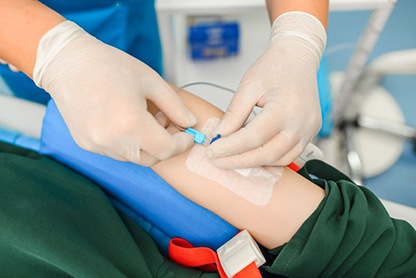
IV sedation, also known as intravenous sedation, uses a small needle in the arm or hand to administer sedative medications, possibly Midazolam or Diazepam, directly into your bloodstream. Some people refer to IV sedation as “twilight sedation” or even “sleep dentistry” because many people feel as if they are unconscious during their treatment (although, technically, they are not).
IV sedation induces a deep state of relaxation. It is quite powerful, and its effects can linger for up to a full 24 hours after a procedure. Therefore, you should avoid driving or doing other potentially dangerous tasks during that window.
Who Is a Good Candidate for IV Sedation?
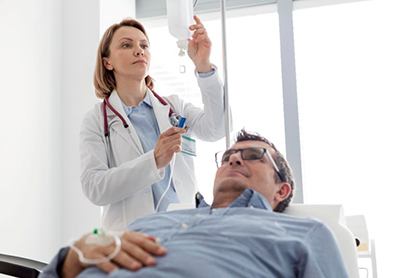
We might recommend IV sedation for you if:
- You need to undergo a complex treatment, or you plan to undergo multiple procedures in a single appointment.
- You struggle with severe dental anxiety.
- You are not easily numbed by local anesthetic.
- You have a severe gag reflex.
- You have medical conditions that make it difficult for you to sit still for an extended period of time.
- Other types of sedation have proven inadequate for you in the past.
- You do not have any contraindications for IV sedation. For example, it might not be suitable for you if you are pregnant or have certain allergies or respiratory conditions.
The Benefits of IV Sedation
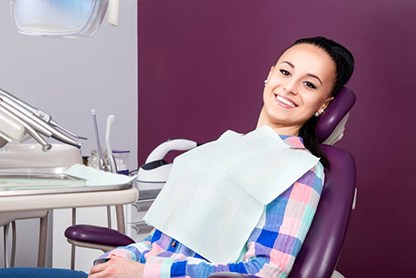
Some top benefits of IV sedation include:
- You are unlikely to remember anything after your appointment, which means you will not need to worry about the sights, sounds, and sensations that you may experience during your procedure.
- We can control your level of sedation throughout your appointment.
- Our team is highly trained in the administration of IV sedation, and we take all necessary precautions to support patient safety.
- IV sedation takes effect very quickly because it is administered directly into the bloodstream.
- Sedation can help to improve the oral and overall health of individuals who struggle with severe anxiety or other conditions that make them reluctant to undergo dental procedures.
General Anesthesia
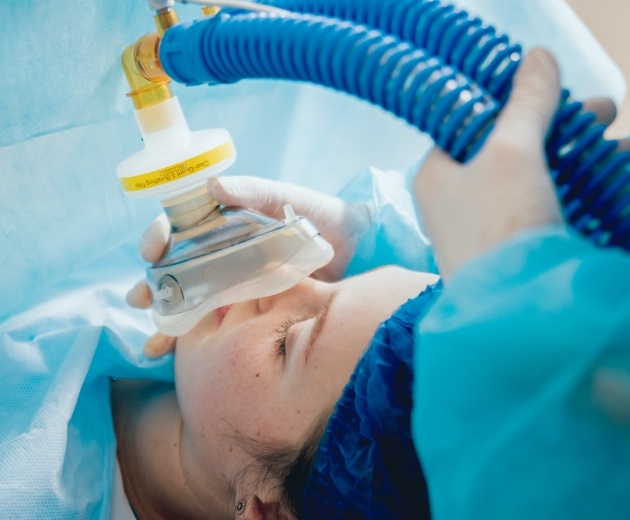
General anesthesia is similar to IV sedation; however, the big difference is that the former will actually put you to sleep. In using this type of treatment, we will closely monitor your vitals to ensure your safety and comfort throughout your procedure. Should you require general anesthesia, you can expect that we will sit down to discuss preparation and expectations so that you are well-informed and ready before the day of your arrival.
Is Oral Conscious Sedation Safe?
When administered by a professional, such as any of our highly experienced oral surgeons, you can expect oral conscious sedation to be safe. With that said, some people may not be eligible for oral conscious sedation, such as those who are obese or have obstructive sleep apnea. People with conditions like these are generally at greater risk of experiencing complications following oral conscious sedation. We’ll make sure you are able to receive sedation safely, no matter what strength of sedation you’re considering.
How Should I Prepare for Oral Conscious Sedation?
Preparing for oral conscious sedation is a relatively straightforward process. You’ll want to avoid eating anything about 6 hours before your appointment, making it ideal to schedule your visit in the morning. Be sure to get a good night’s sleep the night before and have a friend or family member drive you to and from the office the day of your procedure. Because the effects take time to fade away, you’ll need to take the rest of your day off after your appointment is complete. If you typically wear jewelry or other valuables, we recommend leaving them at home. Wear loose-fitting clothing for optimal comfort. If you need to have any prescriptions ready after your treatment (such as painkillers), have them filled before your appointment.
How Long Does Oral Conscious Sedation Take to Kick In?
Oral conscious sedation comes in the form of a pill that is consumed orally and takes roughly 20 minutes to kick in. However, this amount of time can vary based on your body weight and other factors, meaning it could take up to 30 minutes in other circumstances. While you can take the sedative at our office, it’s best to take it prior to arriving at our practice and have someone drive you to your appointment. Our oral surgeons will always make sure the sedative has taken effect before beginning your procedure.
How Will I Feel After Oral Conscious Sedation?
Keep in mind that the effects of oral conscious sedation can take several hours to dissipate completely. You’ll still be awake after receiving the sedative, but barely remember any of your appointment when it completely wears off. However, since the effects take hours to go away completely, you won’t be able to drive a vehicle or perform other tasks properly. A general rule of thumb is to wait at least 24 hours before resuming normal activities. Other common side effects include drowsiness, dry mouth, headache, fogginess, and loss of memory.
IV Dental Sedation FAQs

IV sedation is one of the most powerful relaxation techniques used in oral surgery. It can help even the most nervous and fearful patients to have a positive treatment experience! Still, you may want to learn more before you commit to IV sedation. Below, you will find answers to some relevant FAQs. If we have not addressed your particular points of interest, call our Reston office. We look forward to speaking with you!
Is IV sedation safe?
Iv sedation is generally considered safe. You can be confident that it comes with a very low level of risk because:
- Our team has completed extensive training in the administration of IV sedation.
- We keep a careful eye on patients’ vital signs whenever they are under the influence of sedation.
- The medications used in IV sedation have a decades-long track record of success.
- Complications are rare, and when they do occur, they are usually not severe.
- We carefully screen patients in order to understand any risk factors that could increase the chances of a bad reaction to sedation. We always want to make sure that the rewards of sedation far outweigh the risks!
What should you do before receiving IV sedation?
Before you are sedated, you should:
- Avoid the use of alcohol and tobacco for at least 24 hours.
- Do not eat anything within 8 hours of your procedure or drink within 2 hours (you can have a small sip of water to ingest prescribed medications).
- Arrange for a friend or family member to drive you home from your appointment.
- Put on loose, comfortable clothing.
Does IV sedation cause any side effects?
IV sedation is quite powerful, so it has a greater risk of side effects than milder forms of sedation. You might experience drowsiness, nausea, and a headache. These issues are usually minor and tend to wear off within several hours after the IV has been removed. Usually, the effects of the sedation are completely gone within 24 hours.
Can I eat after receiving IV sedation?
You should only consume clear liquids during the time period immediately after you are sedated. Then, you can move on to soft foods, such as gelatin, pudding, applesauce, and ice cream. After the first 24 hours, you can expand your food choices to things like meatloaf, scrambled eggs, and other fork-tender options. You should continue to stick to soft items until you are fairly well recovered from your oral surgery.
What does it feel like to be sedated at the dentist?
This depends on the type of sedation that you are receiving. Nitrous oxide sedation has the nickname “laughing gas” because it makes patients feel light, relaxed, euphoric, and even giggly. Oral conscious sedation gives patients a deeper sense of relaxation, but you will still be able to answer questions and follow the instructions of the dental team. IV sedation provides similar effects as oral conscious sedation but is more amplified.
How long does dental sedation last?
This varies depending on the type of sedation that you get. The effects of nitrous oxide should wear off within five minutes once you stop inhaling the gas. You can even drive yourself back home or to work after treatment. With oral conscious sedation, the pill’s effects can linger for the rest of the day, so you should avoid driving and operating machinery for 24 hours. As for IV sedation, most of the effects will wear off soon after your procedure, but you may feel groggy for several hours afterward, so you should arrange for someone to drive you to and from your appointment.
Am I a good candidate for sedation dentistry?
If you have been putting off dental work due to dental anxiety, you may be a good candidate for sedation dentistry. It is also a great option for those who:
- Have a low pain tolerance
- Have a sensitive gag reflex
- Have difficulty sitting still
- Don’t get numb easily from local anesthetic
If you are pregnant, have certain medical conditions, or are taking certain medications, you may not be a good candidate. We will go over your medical history with you ahead of time to find out if sedation is the right option for you.
Does dental sedation make you tell secrets?
Contrary to TV shows and movies, dental sedation isn’t a “truth serum.” It is highly unlikely that you will reveal any secrets while you are sedated. However, even if you do say something that you normally wouldn’t while you are under sedation, you can rest assured that it will be kept within the walls of the treatment room.
